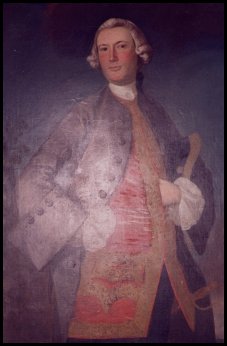Colonel Henry Tucker
Colonel Henry Tucker was President of the Governor’s Council and according to historians a key participant in the Bermuda Gunpowder Plot.
He was born in 1713 into the Tucker family, a prestigious Bermudian family who can trace their ancestry back to the island’s second Governor who arrived in Bermuda in 1616.
he married Anne Butterfield, who was the daughter of Bermuda’s Chief Justice Nathanial Butterfield.
Together they had six children; France [1740-1825], Henry Jr [1743-1808], Thomas [1745-1828], Elizabeth [1747-1837], Nathaniel [1750-1807] and St. George [1752-1827]
Two of his sons St.George Tucker and Thomas Tudor Tucker went on to earn a place in American history.
A merchant by trade, he served as Speaker of the House in the 1740′s and 1750′s, and at one point served as Bermuda’s agent in London.
The book ‘The making and unmaking of a Revolutionary family: the Tuckers of Virginia’ by Phillip Hamilton says that Mr. Tucker’s “ambition was to advance the political status of his growing clan and he either won or bought his colonelcy in the Bermuda militia.”
Long reputed to a key figure in the gunpowder theft of 1775, the official website of CIA says:
In July 1775, Benjamin Franklin and Robert Morris worked out a plan in collaboration with Colonel Henry Tucker, the head of a distinguished Bermuda family, to obtain the store of gunpowder in the Royal Arsenal at Bermuda. To give Bermuda much-needed foodstuffs in exchange for the powder, the Continental Congress resolved on July 15, 1775 to permit the exchange of food for guns and gunpowder brought by any vessel to an American port.
On the night of August 14, 1775, two Patriot ships kept a rendezvous with Colonel Tucker’s men off the coast of Bermuda, and sent a raiding party ashore. An American sailor was lowered into the arsenal through an opening in the roof, and the doors opened from the inside. The barrels of gunpowder were rolled to waiting Bermudian whaleboats and transported to the American ships. Twelve days later half of the powder was delivered to Philadelphia and half to American forces at Charleston.
Died in 1787.
Henry Tucker purchased the Tucker House in 1775. Located on Water Street in St Georges, it is now a museum owned by the Bermuda National Trust. It was bequeathed to them descendant Robert Tucker, when he died in 1950 at the age of 102.
-
Joseph Rainey, a freed slave who became the first African American to be sworn into the U.S. House of Representatives, is thought to have operated a barber’s shop in the Tucker House in the late 1700′s.


